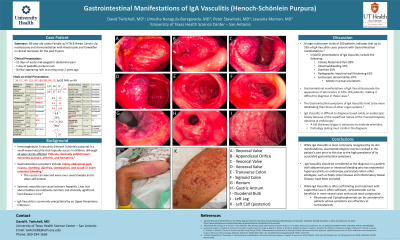Sunday Poster Session
Category: GI Bleeding
P0785 - Gastrointestinal Manifestations of IgA Vasculitis (Henoch-Schönlein Purpura)
Sunday, October 27, 2024
3:30 PM - 7:00 PM ET
Location: Exhibit Hall E

Has Audio

David K. Twitchell, MD
University of Texas Health Science Center
San Antonio, TX
Presenting Author(s)
David K.. Twitchell, MD1, Umesha Naragalu, MD2, Peter Stawinski, MD1, Jawairia Memon, MD1
1University of Texas Health Science Center, San Antonio, TX; 2University of Texas Health San Antonio, San Antonio, TX
Introduction: Immunoglobulin A vasculitis (Henoch-Schönlein purpura) is a small vessel vasculitis which typically occurs in children, although can rarely occur in adults. It is commonly preceded by an upper respiratory infection and is best recognized by its diffuse non-tender, non-pruritic palpable purpura rashes, most prominent on the lower extremities.
Case Description/Methods: A 66-year-old Latina Female with prior cholecystectomy and breast cancer status post mastectomy presented to our hospital with a 10-day history of severe, intermittent, burning post-prandial epigastric abdominal pain which radiated to the rest of the abdomen and a brief episode of melena. Additionally, she reported nausea without vomiting as well as acute constipation with no bowel movements since the onset of her pain 10 days prior. Her symptoms were preceded by a urinary tract infection one week prior which was appropriately treated with antibiotics, but denied upper respiratory symptoms. During her hospitalization, she developed a non-tender and non-pruritic bilateral lower extremity palpable purpura rash with involvement of her abdomen and axilla. The patient reported a similar rash on only one prior occasion when she was undergoing chemotherapy and chemoradiation for breast cancer. The Gastroenterology team was consulted following the resolution of constipation for evaluation of intractable abdominal pain with transaminase elevation in the context of normal CT Abdomen and MRI Abdomen studies and no other clearly identifiable etiology. EGD and Colonoscopy were performed and demonstrated diffuse upper and lower GI shallow mucosal ulcerations. Skin biopsy of purpuric lesions resulted positive for IgA vasculitis.
Discussion: Although IgA Vasculitis is often self-limiting, its Gastrointestinal manifestations are typically the most morbid relative to other organ systems. Severe colicky abdominal pain is nearly always present and is often accompanied by intestinal bleeding, diarrhea, nausea, and vomiting as well as arthralgias and hematuria. Severe cases can result in small bowel obstruction or mesenteric ischemia, which can be life-threatening. Transient transaminase elevation has also been reported. As the Gastrointestinal manifestations of IgA Vasculitis can precede the characteristic purpura distribution in up to 15% of patients, clinical diagnosis can be challenging. Endoscopic mucosal biopsy has inadequate tissue depth to diagnose this condition and requires a full-thickness arterial biopsy.
Disclosures:
David K.. Twitchell, MD1, Umesha Naragalu, MD2, Peter Stawinski, MD1, Jawairia Memon, MD1. P0785 - Gastrointestinal Manifestations of IgA Vasculitis (Henoch-Schönlein Purpura), ACG 2024 Annual Scientific Meeting Abstracts. Philadelphia, PA: American College of Gastroenterology.
1University of Texas Health Science Center, San Antonio, TX; 2University of Texas Health San Antonio, San Antonio, TX
Introduction: Immunoglobulin A vasculitis (Henoch-Schönlein purpura) is a small vessel vasculitis which typically occurs in children, although can rarely occur in adults. It is commonly preceded by an upper respiratory infection and is best recognized by its diffuse non-tender, non-pruritic palpable purpura rashes, most prominent on the lower extremities.
Case Description/Methods: A 66-year-old Latina Female with prior cholecystectomy and breast cancer status post mastectomy presented to our hospital with a 10-day history of severe, intermittent, burning post-prandial epigastric abdominal pain which radiated to the rest of the abdomen and a brief episode of melena. Additionally, she reported nausea without vomiting as well as acute constipation with no bowel movements since the onset of her pain 10 days prior. Her symptoms were preceded by a urinary tract infection one week prior which was appropriately treated with antibiotics, but denied upper respiratory symptoms. During her hospitalization, she developed a non-tender and non-pruritic bilateral lower extremity palpable purpura rash with involvement of her abdomen and axilla. The patient reported a similar rash on only one prior occasion when she was undergoing chemotherapy and chemoradiation for breast cancer. The Gastroenterology team was consulted following the resolution of constipation for evaluation of intractable abdominal pain with transaminase elevation in the context of normal CT Abdomen and MRI Abdomen studies and no other clearly identifiable etiology. EGD and Colonoscopy were performed and demonstrated diffuse upper and lower GI shallow mucosal ulcerations. Skin biopsy of purpuric lesions resulted positive for IgA vasculitis.
Discussion: Although IgA Vasculitis is often self-limiting, its Gastrointestinal manifestations are typically the most morbid relative to other organ systems. Severe colicky abdominal pain is nearly always present and is often accompanied by intestinal bleeding, diarrhea, nausea, and vomiting as well as arthralgias and hematuria. Severe cases can result in small bowel obstruction or mesenteric ischemia, which can be life-threatening. Transient transaminase elevation has also been reported. As the Gastrointestinal manifestations of IgA Vasculitis can precede the characteristic purpura distribution in up to 15% of patients, clinical diagnosis can be challenging. Endoscopic mucosal biopsy has inadequate tissue depth to diagnose this condition and requires a full-thickness arterial biopsy.
Disclosures:
David Twitchell indicated no relevant financial relationships.
Umesha Naragalu indicated no relevant financial relationships.
Peter Stawinski indicated no relevant financial relationships.
Jawairia Memon indicated no relevant financial relationships.
David K.. Twitchell, MD1, Umesha Naragalu, MD2, Peter Stawinski, MD1, Jawairia Memon, MD1. P0785 - Gastrointestinal Manifestations of IgA Vasculitis (Henoch-Schönlein Purpura), ACG 2024 Annual Scientific Meeting Abstracts. Philadelphia, PA: American College of Gastroenterology.
